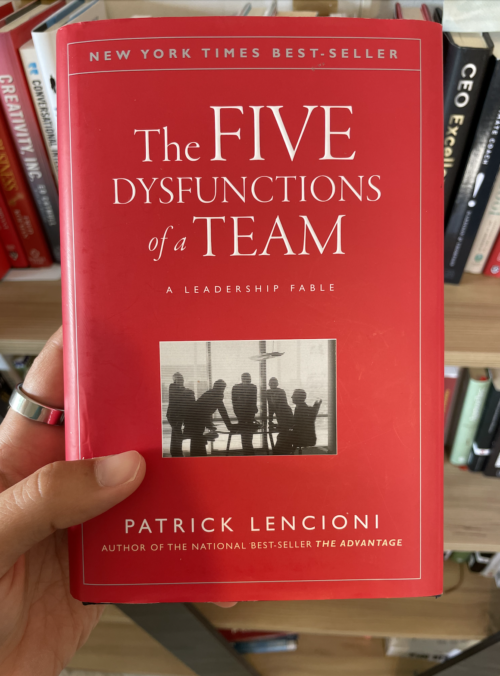Sequoia’s Alfred Lin mentioned this book in a 2014 Stanford lecture about culture.
Probably the best book on how to build a great team.
Here are the 5 dysfunctions of a team—and 5 actionable tips you can use to fix them:
1. Absence of Trust.
No trust means that people are afraid to open up to one another. They are unwilling to admit their mistakes, weaknesses, and concerns. They spend their time and energy managing their behaviour rather than focusing on their jobs.
2. Fear of Conflict.
If people don’t trust each other, they don’t engage in unfiltered and passionate debate. They may have tension—passive, sarcastic, subtle comments—but not constructive conflict in which honest opinions and concerns make it to the surface.
3. Lack of Commitment.
When people don’t unload their opinions or don’t feel like they’ve been listened to, they don’t really get on board. They may feign agreement during meetings but they don’t buy in and commit.
4. Avoidance of Accountability.
Without committing to a clear plan, even the most driven and focused people don’t hold their peers to account for high standards of performance. Because… they didn’t buy into those decisions, they didn’t agree to these things in the first place!
5. Inattention of Results.
Without trust, debate, commitment and accountability, why care? People put their individual needs (ego, career development, recognition) above the collective goals of the team.
—
It all makes sense, right? It’s not the first time you heard about trust and commitment. It’s a simple model, but in practice, it’s not easy to implement. It takes reps and doesn’t happen overnight.
Here are 5 things you can do:
• The leader must walk the talk and demonstrate vulnerability first. Send a clear signal to the team that it’s safe to take risks. This is how you install a culture of trust.
• Invest in time together that goes outside the scope of work. Go round and share one weakness that each one has. It has to be a real weakness that can affect the success of the team. Tell the team what support you’ll need from them while you’re working on your weakness.
• Reframe conflict. Make it explicit that constructive conflict is a good and necessary thing. Start meetings with “What are we debating today?” Meetings are boring because there’s no real debate. If it gets heated, explain that this is a necessary process.
• Make sure everyone is heard in meetings. Pay attention to those who haven’t talked. People don’t have to get their way in a discussion. They just need to be heard, and to know that their input was considered and responded to.
• Remind the team why you’re holding them to account: you want them and the team to succeed. Tell them that it may feel uncomfortable for you to call them out on something. Ask them to call you out when they think that your standards are low.
Loving you, Angelos.
